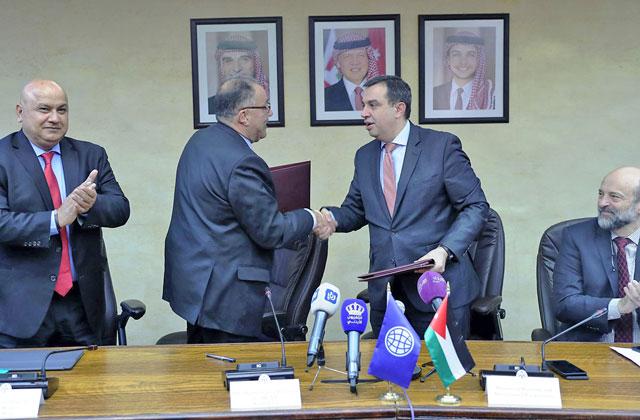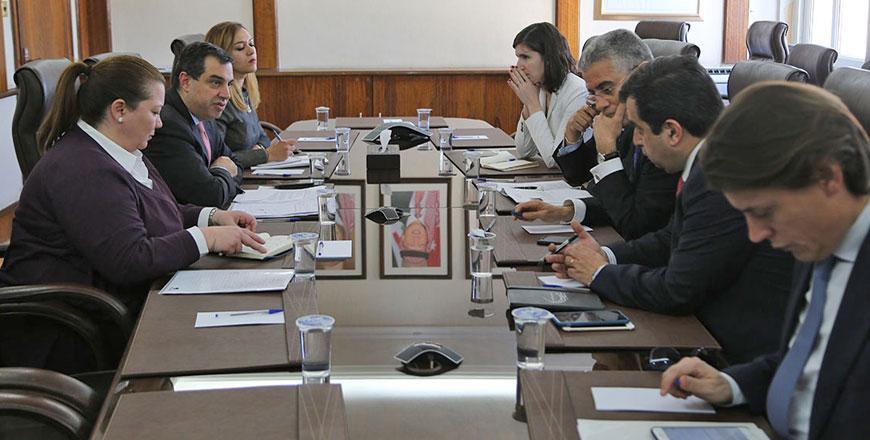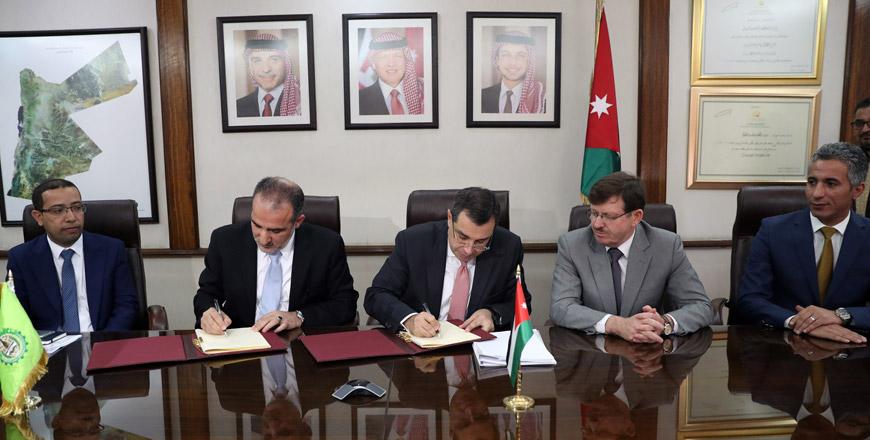You are here
Jordan, WB sign $200m deal to support education for Jordanians and Syrians
By JT - Dec 12,2017 - Last updated at Dec 12,2017

Planning and International Cooperation Minister Imad Fakhoury and Vice President of the World Bank for Middle East and North Africa Hafez Ghanem shake hands after signing a financing deal to support education in Amman on Tuesday (Photo courtesy of Planning and International Cooperation Ministry)
AMMAN — The government and the World Bank (WB) on Tuesday signed a financing agreement to fund a programme to reform the education sector in Jordan with a value of $200 million.
The agreement was signed by Planning and International Cooperation Minister Imad Fakhoury and Vice President of the World Bank for Middle East and North Africa Hafez Ghanem.
The signing ceremony was attended by Minister of Education Omar Razzaz and representatives of the main donor countries and organisations in the Kingdom.
In his remarks at the event, Fakhoury said that the agreement includes $147.7 million to be extended as a concessional loan from the WB blended with a contribution from the Global Concessional Financing Facility (GCFF) for $52.3 million that was approved by the GCFF Steering Committee at the end of October.
The repayment period of the loan extends over thirty-five years and includes a grace period of five years and a favourable interest rate, said the minister.
He pointed out that the funding will be directed to the general budget with a value of $192 million. It also includes a technical support component for the Education Ministry worth $8 million in line with the National Strategy for Human Resource Development 2016-2025.
The first installment of the programme will be transferred at a value of $77 million to the Treasury before the end of this month.
Fakhoury said that the results-oriented programme will assist the Education Ministry in implementing its new five-year plan, which is based on the human resources strategy.
The plan will focus on the following priorities: expanding access to and improving the quality of early childhood education, improving children’s teaching and learning conditions, reforming the student assessment system and certification and strengthening the management of the education system, according to the minister.
He added that it is expected that the number of beneficiaries of the programme will reach about 700,000 students, taking into consideration that Jordan provides government education services not only to Jordanians, but also to Syrian refugees. It will also provide training for more than 30, 000 teachers.
For his part, Ghanem said: “Quality education is at the centre of the economic and social development process, and that is why we are delighted to sign today’s agreement to be partners with Jordan in carrying out its ambitious reforms.”
Fakhouri noted that GCFF was launched last year by the World Bank, the UN and the Islamic Development Bank with the support of Japan, the UK, Germany, Canada, the US, the Netherlands, Sweden, Norway, Denmark and the EU.
He added that this facility came in response to Jordan’s official request to the WB in the spring of 2015 to find innovative and affordable financing mechanisms to respond to the needs of high middle income countries affected by conflicts and crises such as Jordan and Lebanon, which are, in principle, not eligible for concessional financing.
Jordan hosts around 1.3 million Syrian refugees, who have put tremendous pressure on the basic services provided to them and to host communities, said Fakhoury, adding: “Our countries are already facing financial and economic challenges and slowing growth rates, hence this initiative to alleviate the costs of soft loans provided.”
Jordan has benefited from this mechanism by $167.7 million to date in the form of grants, while soft loans amounted in value to $868.7 million, with an interest rate ranging between 1-2 per cent and long repayment periods.
Related Articles
AMMAN — Jordan and the World Bank (WB) on Sunday discussed proposed deals under which the bank would extend three further loans to Jordan.Th
AMMAN — The World Bank disbursed approximately $554 million to four projects it implemented with the Jordanian government for the fiscal yea
AMMAN – The Ministry of Planning and International Cooperation on Thursday signed a $100 million grant and loan agreement with the Islamic D













